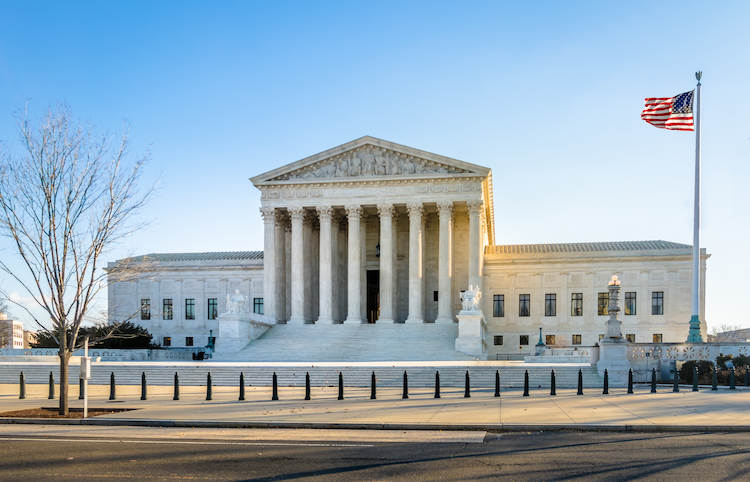SCOTUS to Take Up Abortion Again in April

The U.S. Supreme Court will take up abortion again with oral arguments in Moyle v. United States scheduled for April 24, 2024. The issue before the Court is whether Idaho’s strict abortion law is preempted by the Emergency Medical Treatment and Labor Act (EMTALA) in situations where an abortion is necessary stabilizing treatment for an emergency medical condition.
Facts of the Case
The EMTALA obligates Medicare-funded hospitals to provide medical treatment for emergency medical conditions, regardless of a patient’s ability to pay. Under the EMTALA, a Medicare-participating hospital must (1) perform “an appropriate medical screening examination” to see whether the patient has an emergency medical condition; (2) conduct a further medical exam along with “such treatment as may be required to stabilize the medical condition” or send the patient “to another medical facility; and (3) transfer a patient with an emergency medical condition that has not been stabilized only as provided and where “appropriate.”
Idaho Code § 18-622 (section 622), entitled the “Defense of Life Act,” makes it a crime for anyone to perform an abortion unless a physician acts within exceptions that the statute enumerates. Under one exception, a physician may perform an abortion when “necessary to prevent the death of the pregnant woman,” based on “good faith medical judgment and based on the facts known to the physician at the time.” Another exception permits an abortion (during the first trimester) to terminate a pregnancy resulting from rape or incest.
A trigger provision in the original version of section 622 provided that the law would become effective 30 days after a decision by the Supreme Court “that restores to the states their authority to prohibit abortion.” Following the Supreme Court’s decision in Dobbs v. Jackson Women’s Health Organization, section 633 presumptively took effect on August 25, 2022.
That day, the United States filed suit against the State of Idaho claiming that section 622 violates the Supremacy Clause. The suit contends that that EMTALA requires Medicare-participating hospitals to provide an abortion as “stabilizing care” when a pregnant woman suffers an “emergency medical condition” that demands it. The Department of Justice (DOJ) asked the federal district court to rule that the Idaho law “is preempted and therefore invalid to the extent that it conflicts with EMTALA.”
Issues Before the Supreme Court
U.S. District Judge B. Lynn Winmill issued a preliminary injunction prohibiting Idaho from enforcing its law, holding that Idaho was unlikely to prevail on the merits because “EMTALA does not require abortions, and even if it did in some circumstances, that requirement would not directly conflict with section 622.” The full Ninth Circuit Court of Appeals declined to place the ruling on hold while the state’s appeal continued. Idaho filed an application for stay with the U.S. Supreme Court. The Court granted the stay and also treated the application as a petition for a writ of certiorari before judgment, which it granted.
The justices have agreed to consider the following issue: “Whether the Supreme Court should stay the order by the U.S. District Court for the District of Idaho enjoining the enforcement of Idaho’s Defense of Life Act, which prohibits abortions unless necessary to save the life of the mother, on the ground that the Emergency Medical Treatment and Labor Act preempts it.”
The Court will hear oral arguments next month with a decision expected by the end of the term in June.
Previous Articles
Supreme Court Rejects Mexico’s Suit Against U.S. Gun Manufacturers
by DONALD SCARINCI on July 8, 2025
In Smith & Wesson Brands v. Estados Unidos Mexicanos, 605 U.S. ____ (2025), the U.S. Supreme Co...
SCOTUS Sides With Employee in Reverse Discrimination Case
by DONALD SCARINCI on July 2, 2025
In Ames v. Ohio Department of Youth Services, 605 U.S. ____ (2025), the U.S. Supreme Court held tha...
Supreme Court Rejects Moment of Threat Doctrine in Deadly Force Case
by DONALD SCARINCI on June 30, 2025
In Barnes v. Felix, 605 U.S. ____ (2025), the U.S. Supreme Court rejected the Fifth Circuit Court o...
The Amendments
-
Amendment1
- Establishment ClauseFree Exercise Clause
- Freedom of Speech
- Freedoms of Press
- Freedom of Assembly, and Petitition
-
Amendment2
- The Right to Bear Arms
-
Amendment4
- Unreasonable Searches and Seizures
-
Amendment5
- Due Process
- Eminent Domain
- Rights of Criminal Defendants
Preamble to the Bill of Rights
Congress of the United States begun and held at the City of New-York, on Wednesday the fourth of March, one thousand seven hundred and eighty nine.
THE Conventions of a number of the States, having at the time of their adopting the Constitution, expressed a desire, in order to prevent misconstruction or abuse of its powers, that further declaratory and restrictive clauses should be added: And as extending the ground of public confidence in the Government, will best ensure the beneficent ends of its institution.





